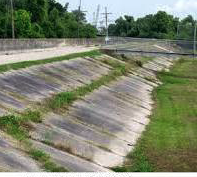FLOOD CONTROL HINDERED BY LEVEE BOARDS?
Monday, April 28, 2025.
Baton Rouge, Louisiana
FLOOD CONTROL HINDERED BY LEVEE BOARDS?
Legislation is working its way through the Louisiana legislature that would strip levee districts of their autonomy. A Board members of several large levee boards are crying foul, and charge that flood protection will suffer and emergency responses will slow down. Louisiana has twenty-three levee boards that cover the state’s waterways from the Arkansas border to the Gulf of Mexico. But here’s the question. Why have any levee boards at all?
For well over the first 200 years of Louisiana’s existence, all flood control efforts were constructed and initially paid for by the riverfront landowner, then by parishes adjoining the river, and then by funds raised by local levee boards. Federal involvement came about in 1917 with the passage of the Ransdell-Humphreys Flood Control Act, a flood control program designed to give protection up and down the Mississippi Valley. There was no requirement in this, and federal legislation that followed, that states seeking flood protection from levee boards.
Few other states have levee boards or levee districts. Mississippi has two. A number of states bordering the Mississippi River have none.
Louisiana spends hundreds of millions of dollars a year on various other construction projects without the oversight of any appointed board. In this fiscal year, there is some $124 million in public building construction projects taking place in Louisiana. The state budget for highway construction this year will top $794 million. No Governor appointed board is in place to oversee any of this construction.
The simple fact is that having non-professionals appointed to boards that are given direct authority and control over basic protection to our public safety makes no sense in the 21st century. Professionals within the Louisiana State Department of Public Works and the U.S. Corps of Engineers would seem much better qualified to design the necessary flood protection plan, and oversee both the construction and maintenance of such important projects.
If the Corps of Engineers, as was alleged following Hurricane Katrina, made some serious errors in design and construction of our levy protection system, then certainly they should be held accountable. But do we continue to allow untrained, average citizens with no professional background to make decisions that, as we have tragically seen, can lead to serious of consequences including the loss of human life?
Merely scaling down the present 23 levee boards to a handful doesn’t really address the problem. Levee boards are outdated. They are a thing of the past.
The Dutch do not turn over the protection of their entire nation, a country that rests primarily below sea level, to a board of non-professionals. Neither do the Italians in their efforts to defend their city on the sea, Venice. We live in the richest, most powerful and technologically advanced nation on earth. Surely the Governor, the Legislature, and the federal government can get together and work out a better administrative system than what we now have in place. There’s too much at stake.
Is electing levee boards the answer, as has been suggested by former U.S. Senator Mary Landrieu? That makes about as much sense as electing firemen and policemen.
The 23 levy boards that are scattered throughout Louisiana are, for the most part, made up of decent, hardworking people who hold a variety of jobs, and they all have one thing in common: they know nothing about building and maintaining levees.
In the levee district debate presently before the legislature, there is an opportunity to end the parochialism that pits one parish or district against another. Statewide oversight would allow decisions to be made that are for the good of the state as a whole instead of drawing lines that shouldn’t exist.
Simply put, these times call for changes in the age-old system of political fiefdoms in the Bayou State. Take the politics out of levee engineering. That’s the way it works all over the world. Why should Louisiana be any different?
Peace and Justice
Jim Brown
Jim Brown’s syndicated column appears each week in numerous newspapers throughout the nation and on websites worldwide. You can read all his past columns and see continuing updates at http://www.jimbrownla.com.




